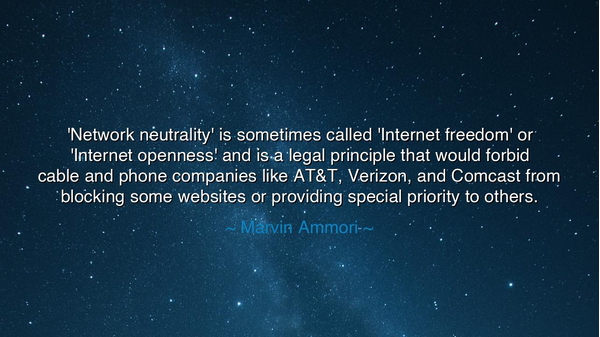
'Network neutrality' is sometimes called 'Internet freedom' or
'Network neutrality' is sometimes called 'Internet freedom' or 'Internet openness' and is a legal principle that would forbid cable and phone companies like AT&T, Verizon, and Comcast from blocking some websites or providing special priority to others.






In the chronicles of human civilization, few concepts carry the quiet power of freedom and equality in access. Marvin Ammori’s words, “'Network neutrality' is sometimes called 'Internet freedom' or 'Internet openness' and is a legal principle that would forbid cable and phone companies like AT&T, Verizon, and Comcast from blocking some websites or providing special priority to others,” illuminate a modern struggle that echoes the agoras of ancient cities. Just as citizens once demanded open forums to speak, trade, and exchange ideas without obstruction, the digital age calls for a space where information flows freely and equitably, unimpeded by those who control the gates of communication.
From the marketplaces of Athens to the forums of Rome, open access to discourse was recognized as the lifeblood of civic and commercial life. Merchants, philosophers, and citizens depended upon the fair and unimpeded exchange of ideas and goods. Ammori’s reflection situates network neutrality as the digital counterpart of this ancient principle: the Internet, like the agora, must remain open to all, neither favoring the wealthy nor silencing the vulnerable. In this way, the law becomes a guardian of liberty, ensuring that access is determined by merit and interest, not by privilege or control.
The historical origins of this principle lie in the evolution of the Internet and the growing power of telecommunications companies. As providers of the infrastructure that connects the world, companies like AT&T, Verizon, and Comcast wield immense influence over the flow of information. Ammori’s definition of network neutrality underscores the need for a legal framework to prevent these gatekeepers from deciding which voices are heard or which ideas flourish. Without such protections, the freedom of the digital commons would be threatened, much as ancient empires once sought to control the flow of trade and knowledge.
Consider a vivid example: in 2007, Comcast was found to be throttling peer-to-peer traffic, slowing connections for certain users while leaving others unaffected. This incident illuminated the dangers Ammori describes: without network neutrality, Internet service providers could pick winners and losers, stifling innovation and limiting freedom of expression. Activists and policymakers rallied to defend the principle, advocating for regulations that would enshrine openness as a legal right, a reflection of society’s enduring commitment to equality and justice in communication.
Philosophically, network neutrality embodies the ancient wisdom that access to shared resources must be fair and equitable. Just as waterways, roads, and marketplaces in old societies were considered public goods, the Internet functions as a modern commons, enabling commerce, creativity, and discourse. Ammori’s words remind us that the principle is not merely technical, but moral: it protects the rights of individuals to connect, create, and communicate without interference or favoritism.
The lesson for today is profound. Citizens, businesses, and policymakers must recognize that the guardianship of open networks is essential for a flourishing society. Defend the principle of neutrality not only to ensure fairness but to preserve innovation, diversity of thought, and the equitable flow of opportunity. The history of human progress teaches that societies thrive when access is open and transparent, and falter when control is concentrated in the hands of a few.
Practically, this teaching calls for engagement and vigilance. Support laws and policies that enforce network neutrality, hold Internet service providers accountable, and advocate for transparency in digital infrastructure. Encourage fair competition and protect the rights of innovators and creators, ensuring that the digital commons remains vibrant and accessible. In doing so, the spirit of ancient agoras is revived in a modern context, preserving the freedom of the global conversation.
Thus, Marvin Ammori’s words resonate as a timeless reminder: the Internet, like the marketplaces and forums of old, must remain open and free, a space where ideas, commerce, and expression flourish without obstruction. Let this principle guide our stewardship of the digital age, honoring the wisdom of the past while securing a future where freedom, equity, and opportunity flow unimpeded through the channels of human connection.






AAdministratorAdministrator
Welcome, honored guests. Please leave a comment, we will respond soon